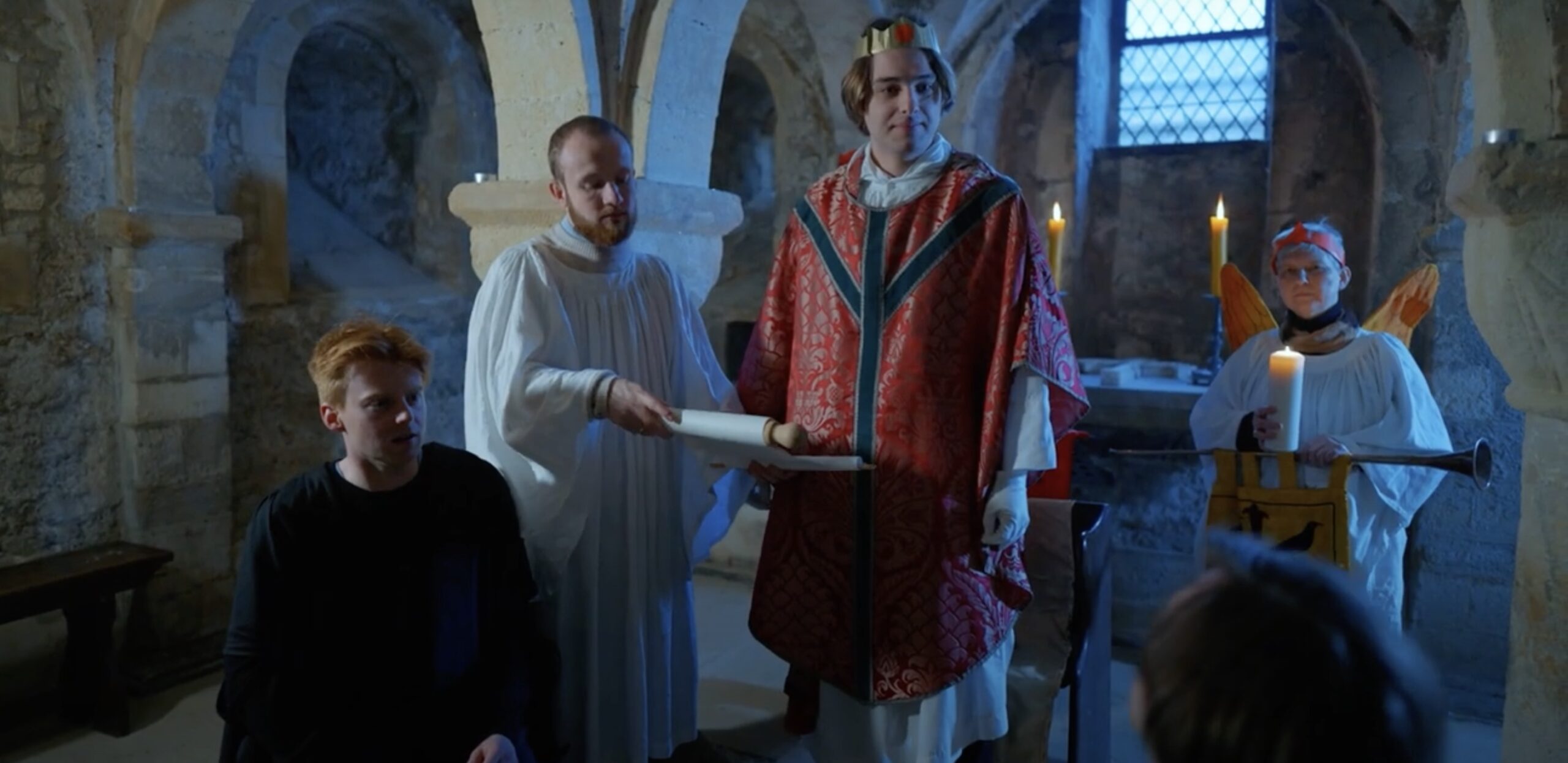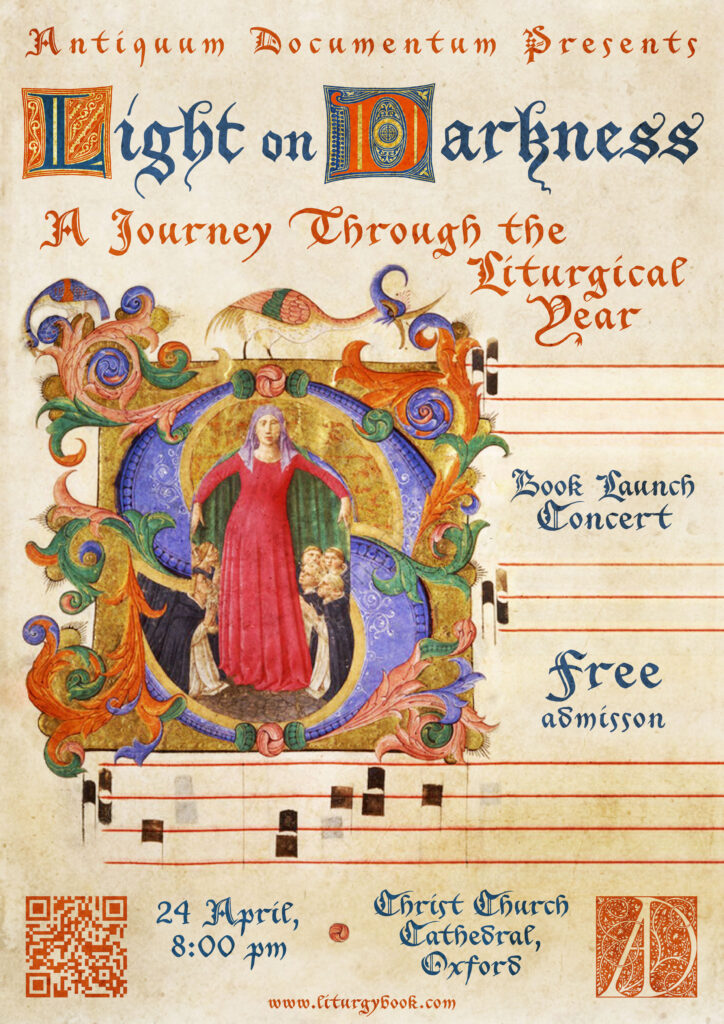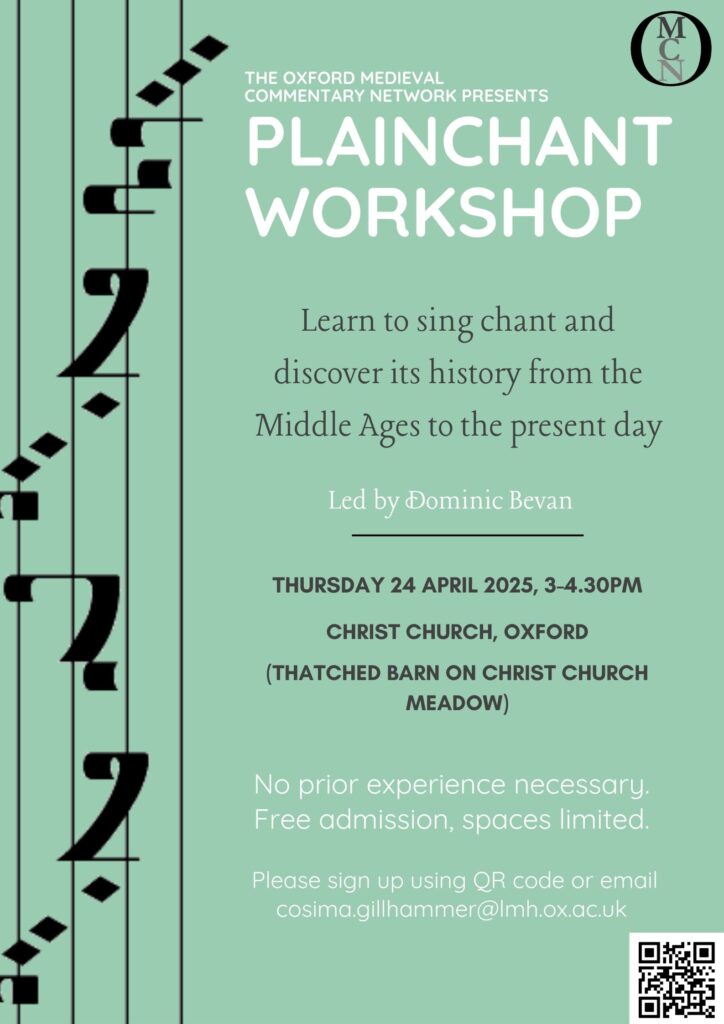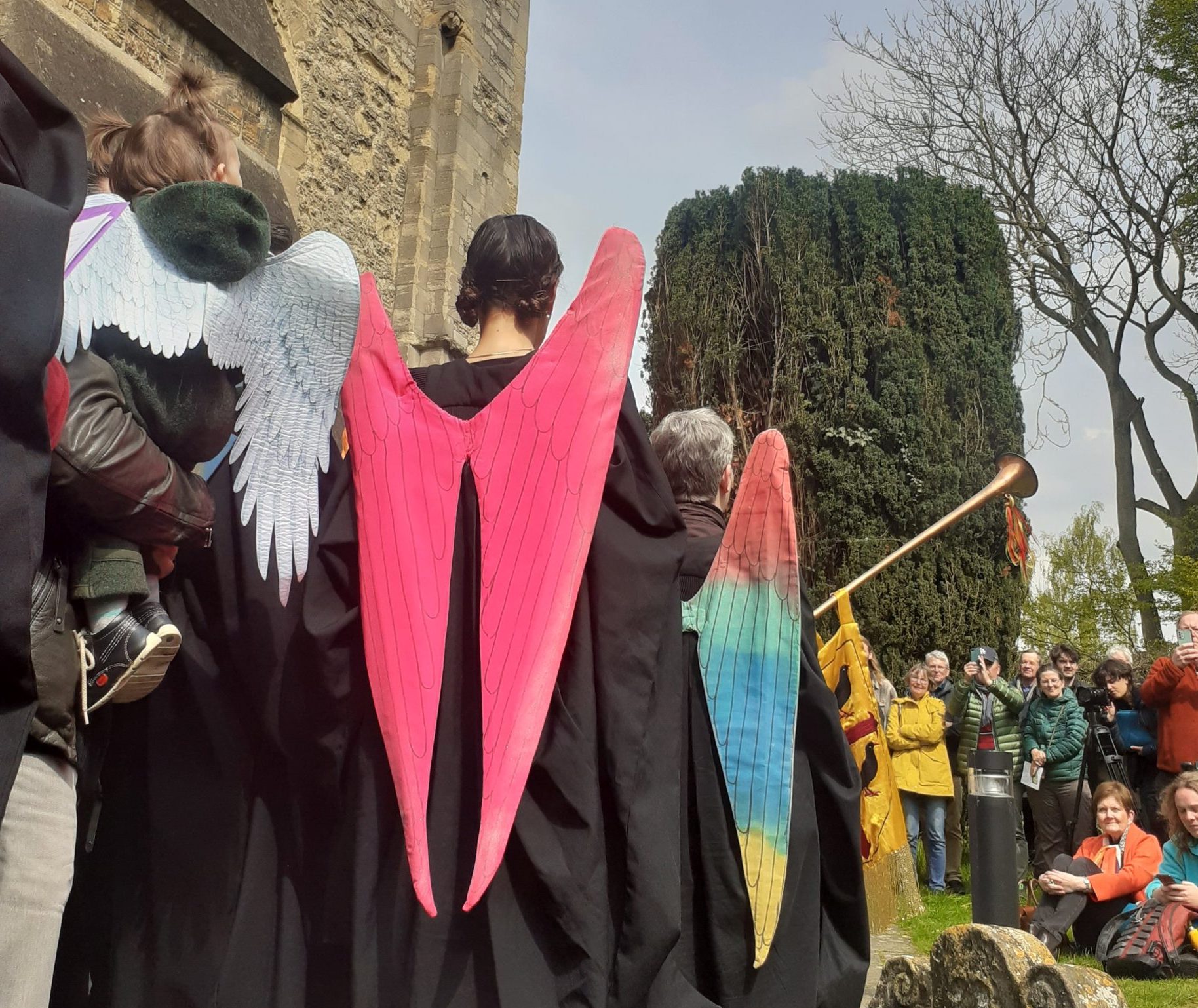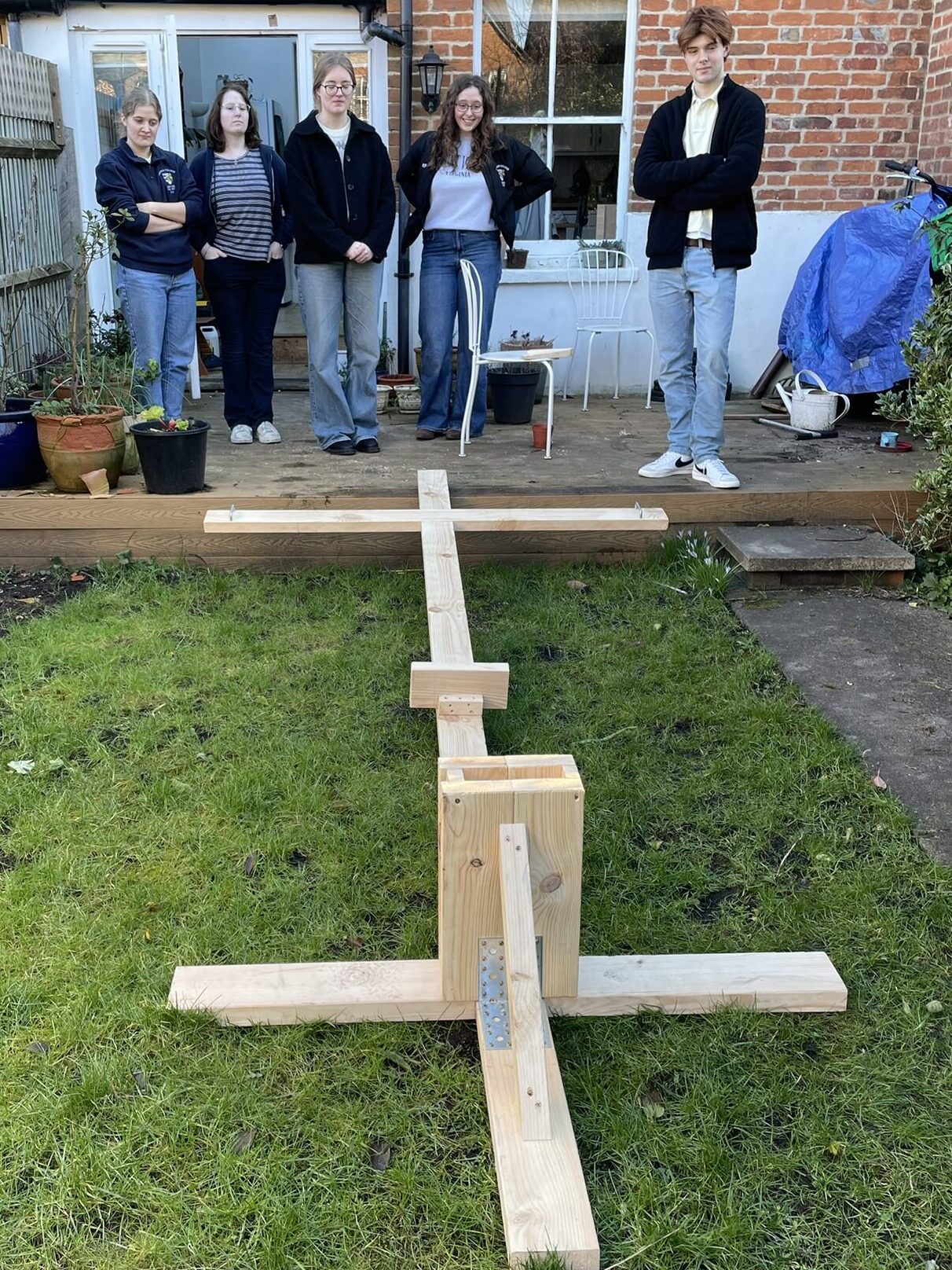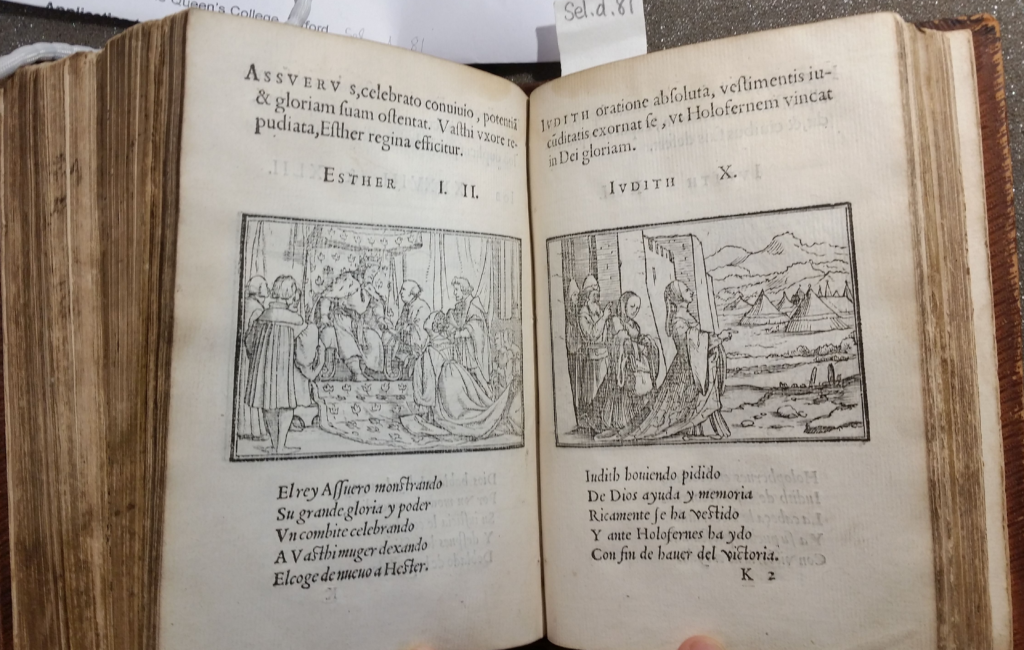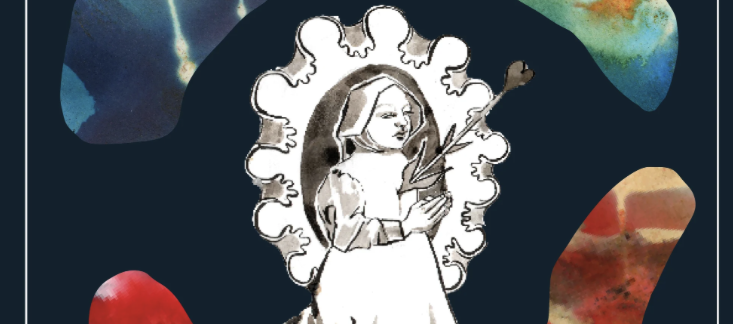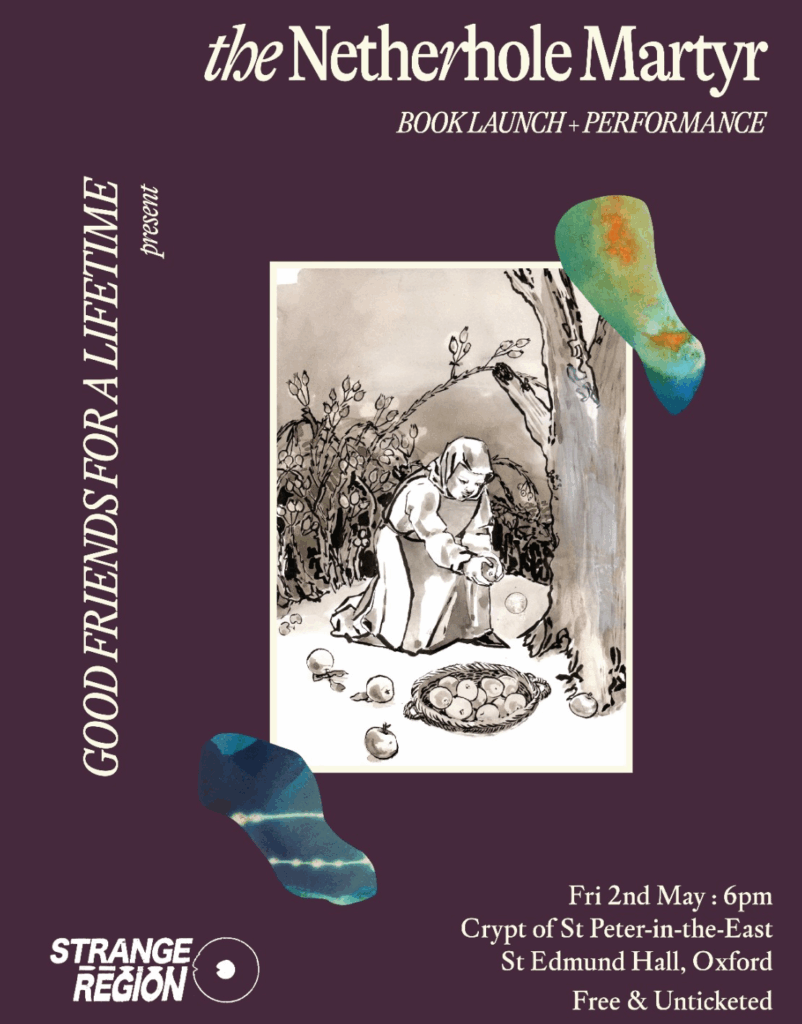From the Creation to Judgement Day
The Oxford Medieval Mystery Plays 2025 are over – thank you to everyone who made this day possible! Read on for some pictures and impressions of a wonderful day. You can access the full programme, scroll through film stills by the camera team, and watch it on the OMS Youtube channel.
01:12 – The Fall of the Angels (Angels of Oxford) – Middle English 13:45 – Adam and Eve (Oxford German Medievalists) – Hans Sachs, German 34:56 – The Flood (The Travelling Beavers) – Middle English 55:02 – Abraham and Isaac (Shear and Trembling) – Middle English 1:11:14 – The Annunciation (Low Countries Ensemble) – Middle Dutch 1:19:26 – The Nativity (Les Perles Innocentes) – Marguerite de Navarre, French 1:45:53 – The Wedding at Cana (Pusey House) – Modern English, with Middle English archaisms 2:00:30 – The Crucifixion (The Wicked Weights) – Middle English 2:15:15 – The Lamentation (St Edmund Consort) – Bordesholmer Marienklage, Low German and Latin 2:30:53 – The Harrowing of Hell (The Choir of St Edmund Hall) – Latin Sequence 2:33:30 – The Resurrection (St Stephen’s House) – Middle English 2:55:14 – The Martyrdom of the Three Holy Virgins (Clamor Validus) – Hrosvitha of Gandersheim, Latin and modern English 3:20:10 – The Last Judgement (MSt English, 650–1550) – Modern English
The fourth iteration of the Oxford Medieval Mystery Plays took place on 26 April at St Edmund Hall. And it was a truly marvellous day! A total of 13 plays were put on by about 150 participants – actors, directors, singers, costume designers, musicians, and many more. Throughout the day, about 350 audience members popped in and out of Teddy Hall, some staying for shorter periods, others for several hours or the whole day. Audience members and participants included a wonderful range: undergraduate and graduate students and academics from within and without Oxford, a full children’s choir, tourists, and members of the public found their way to Teddy Hall and partook in the medieval shenanigans.
And what shenanigans they were! This year, we are particularly proud of the incredible diversity of languages, plays, and different approaches on display. But see for yourself … (All photo credits are at the bottom of the post)
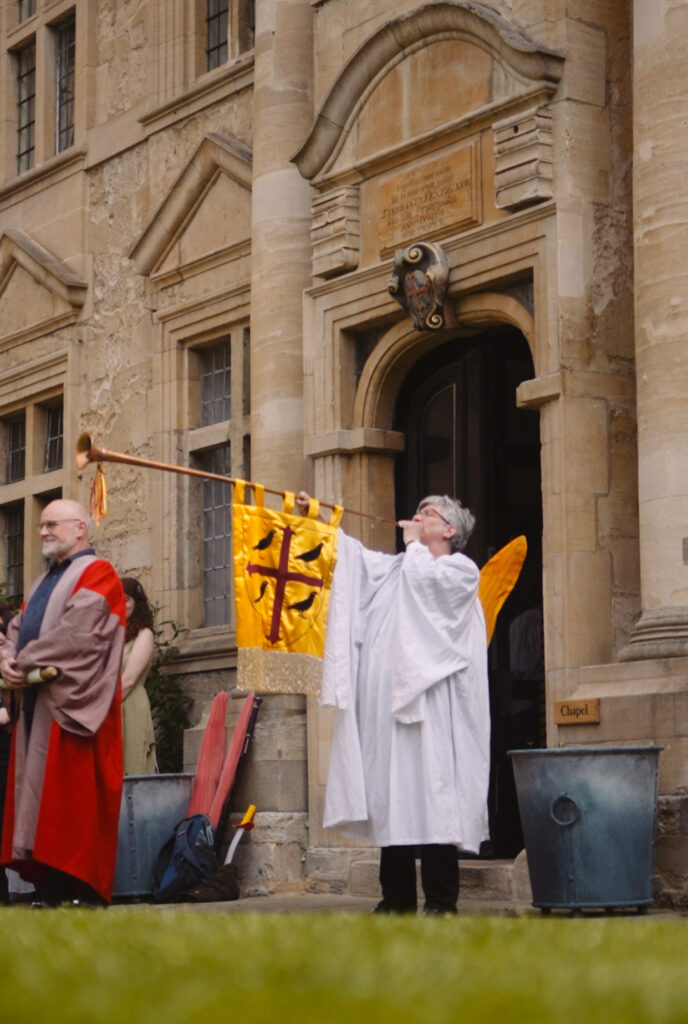
The day started – how could it be otherwise – with a trumpet blast from Henrike Lähnemann herself (Picture 1).
Once again, we were expertly guided through the day by Jim Harris, the Master of Ceremonies. Armed with Bruce Mitchell’s doctoral gown and the ceremonial scroll (consisting of the baking roll to the chaplain of St Edmund Hall, half a coat hanger and numerous layers of paper and sellotape), he introduced each play with a modern English prologue (Picture 2).
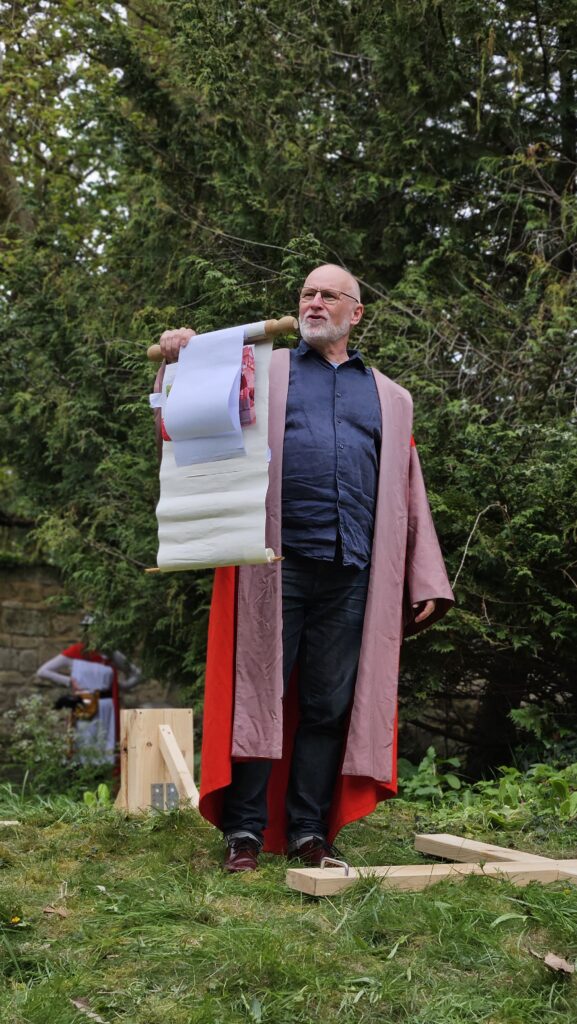
We began at the beginning, with the creation of the world and The Fall of the Angels, performed mostly in Middle English, but with modern English elements, and in a modern office setting.
Picture 3: The Holy Trinity is being fawned over by the two good angels … but trouble awaits: the two bad angels are getting arrogant, before their inevitable ejection from Heaven.
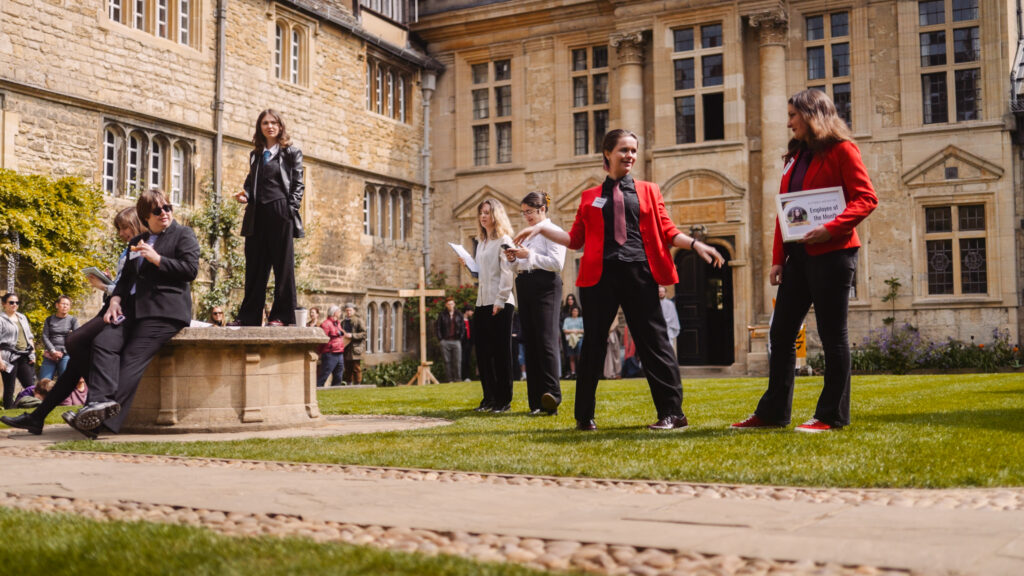
From the angels, we moved swiftly on to humans: next was the German Adam and Eve play by Hans Sachs, featuring a particularly good use of the well (the two humps underneath the spare green coat are Adam and Eve, about to be created).
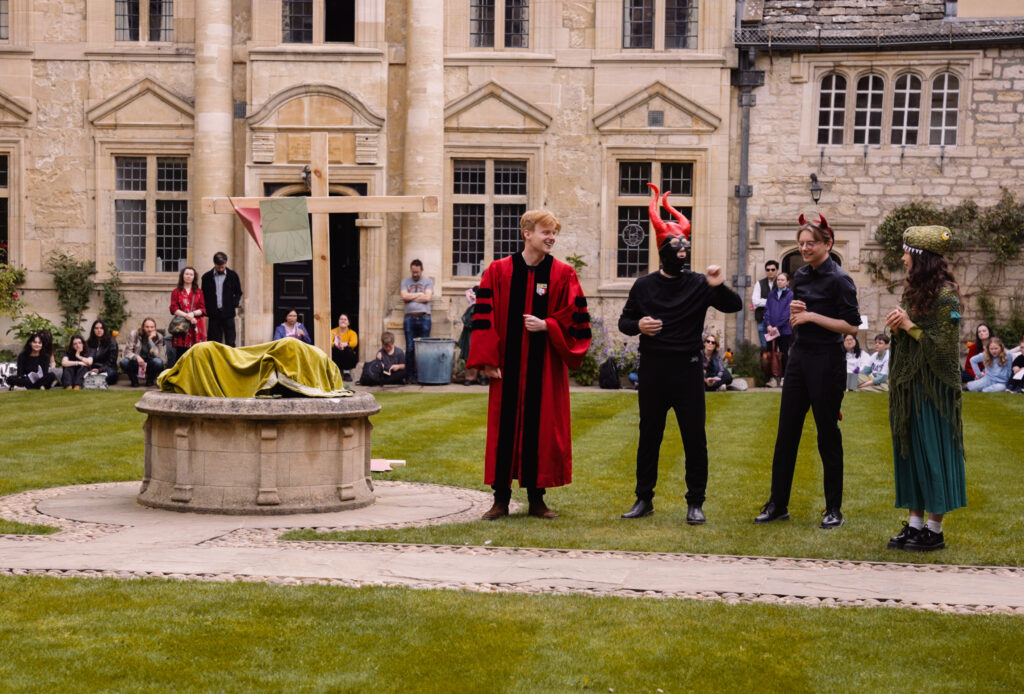
Picture 4: All could be well in Eden, if it wasn’t for Lucifer, Belial, Satan, and the Serpent conspiring.
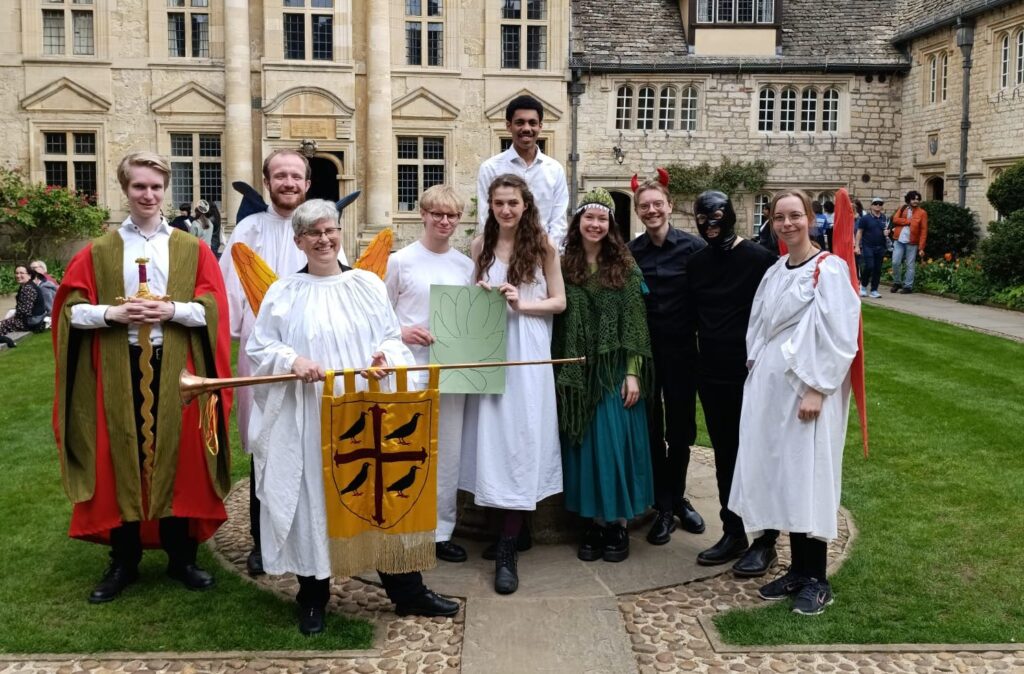
Picture 5: Adam and Eve might have fallen into desperation, but the cast have good reason to be proud of themselves, having made it to the front page of both the Oxford Mail and Oxford Times.
Skipping a few biblical ages, we next saw the Flood, presented in the Middle English Chester version.
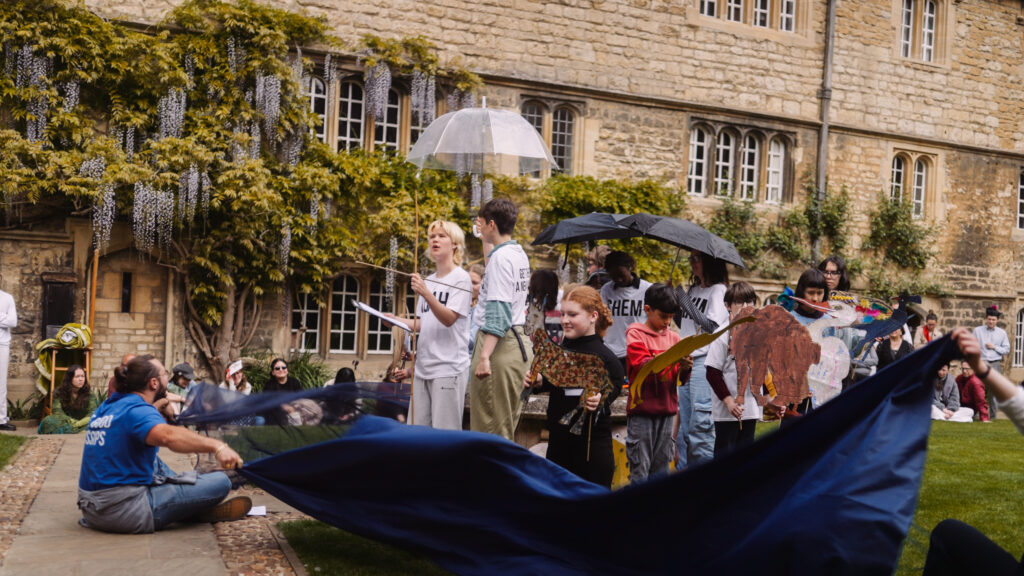
The Old Testament concluded with the Middle English York version of Abraham and Isaac.
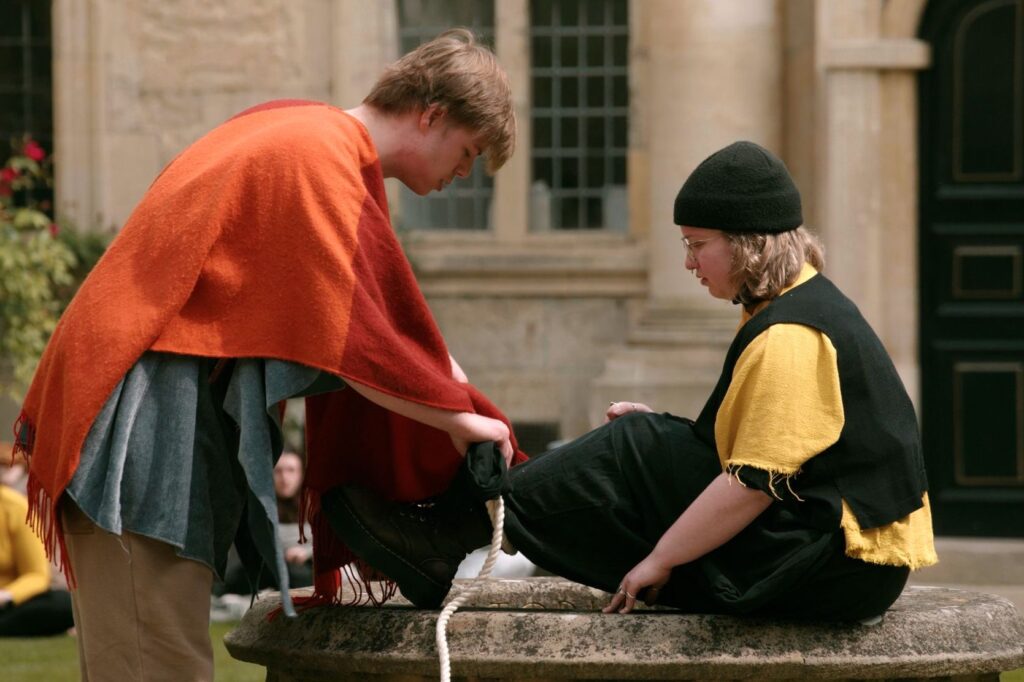
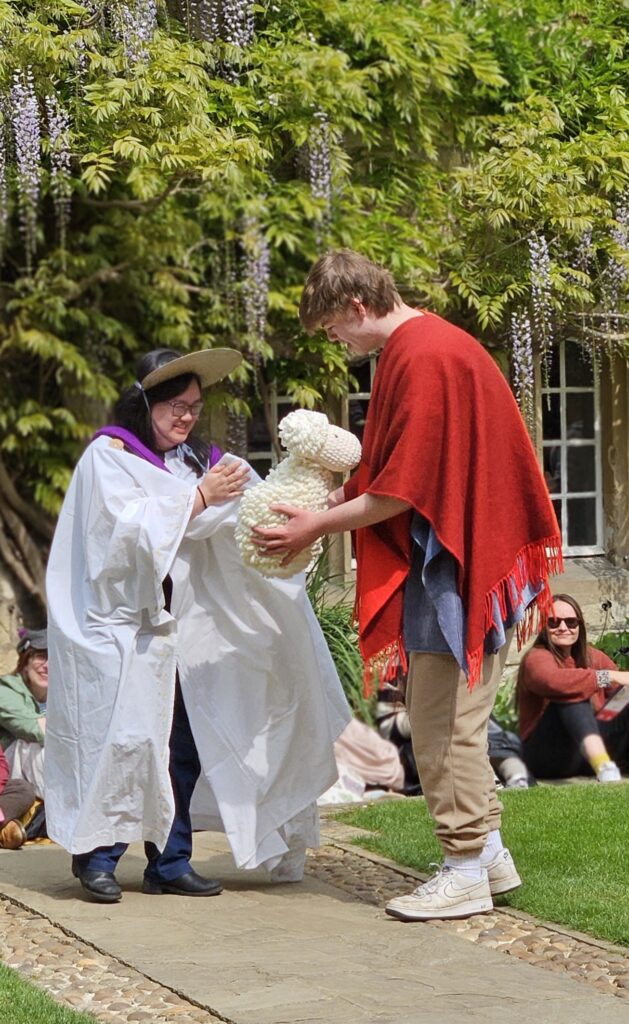
Will he really do it? Abraham is getting ready to sacrifice his oldest son, Isaac (Picture 7) … but fear not! The angel of the lord approaches and shows him a sheep to sacrifice instead – the little guy, hand-crocheted by one of the cast members, rapidly became the true star of the day (Picture 8).
After a refreshing tea break, we moved from the Front Quad into the Churchyard, and from the Old to the New Testament. The fifth play of the day was the Annunciation, or rather Die Eerste Bliscap van Maria (‘The First Joy of Mary’). It was performed in Middle Dutch: a first (but hopefully not last) for the Oxford Medieval Mystery Plays!
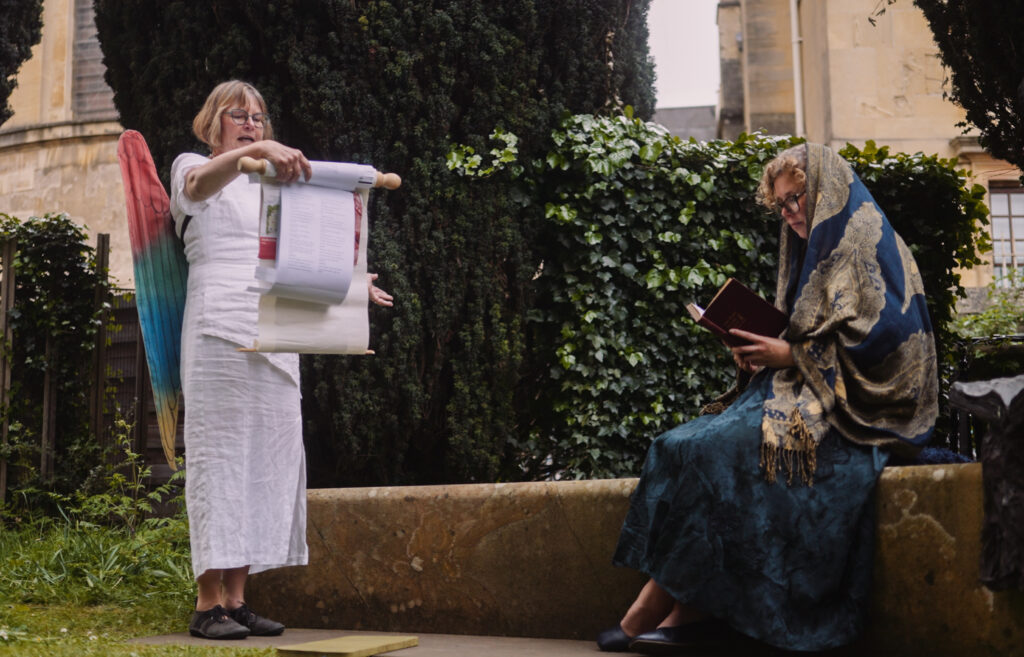
Picture 9: The angel Gabriel announces the happy news to the reading Mary.
True to the Gospels, the Annunciation was followed by the Nativity. It was a particular pleasure to welcome back Les Perles Innocentes, who travelled all the way from Fribourg to wow us with their expert performance of the Comédie de la Nativité, written by none other than Marguerite de Navarre.
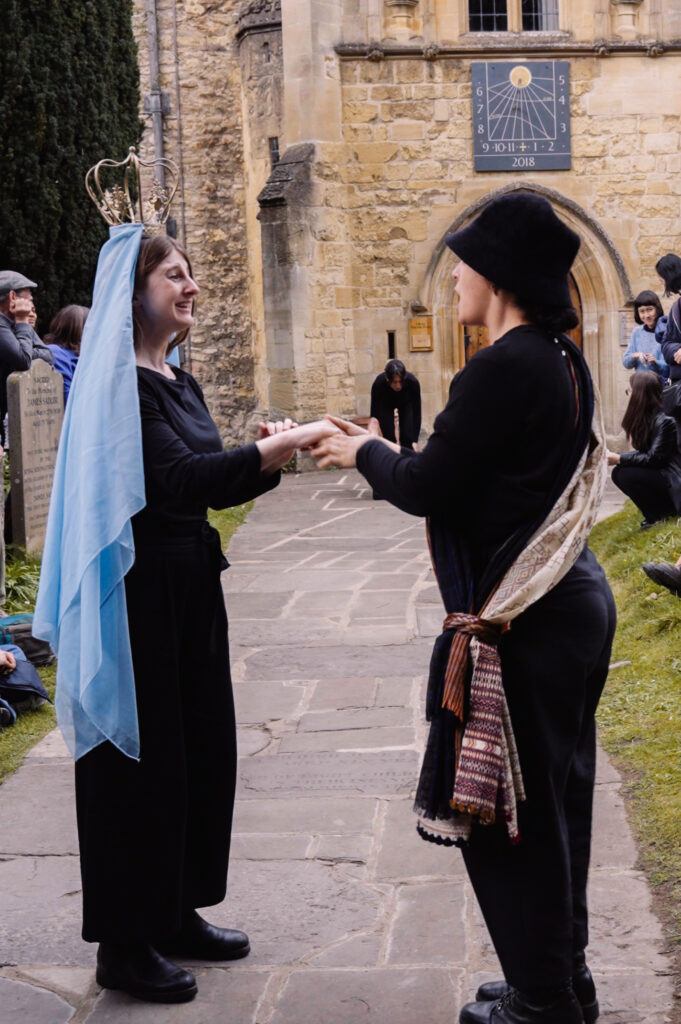
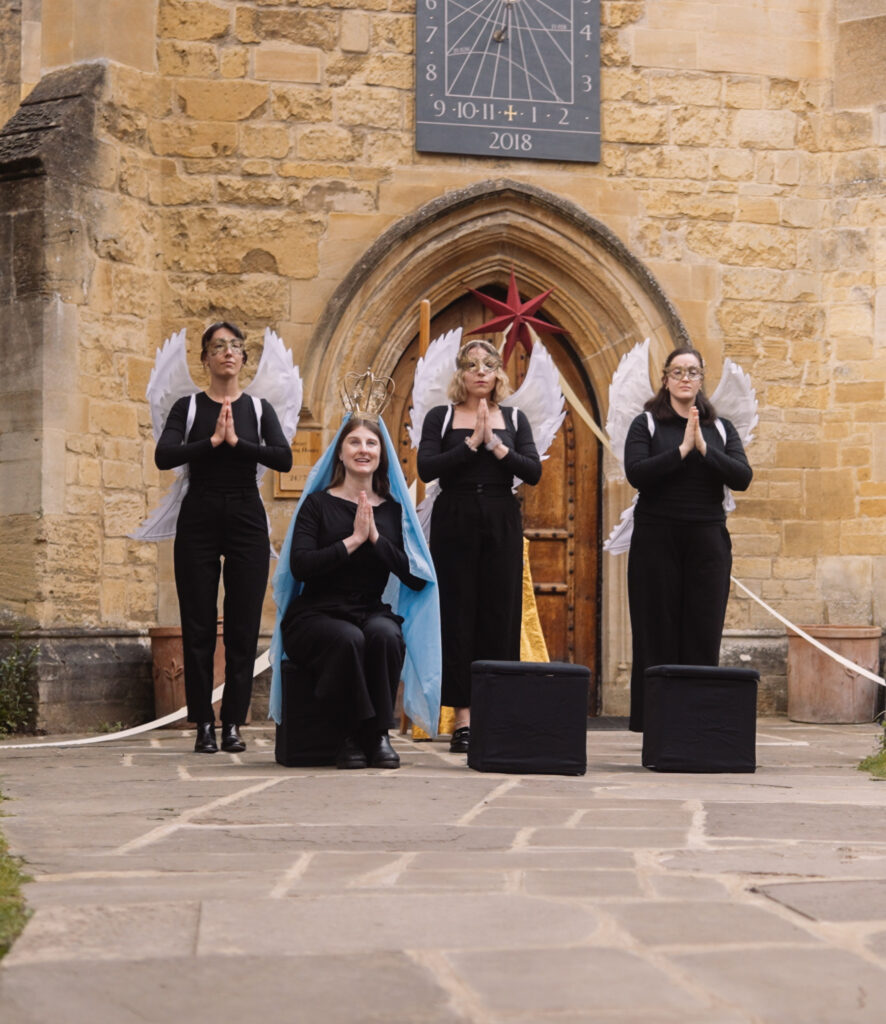
Picture 10: Mary and Joseph are desperately looking for a place for Mary to give birth. – Picture 11: If the stable looked as gorgeous as the library of Teddy Hall, it surely wasn’t the worst place to be born in!
Our next play skipped ahead, showing us the grown-up Christ at the Wedding at Cana. This play was a world premiere, reconstructed from only 1.5 surviving lines in the York cycle!
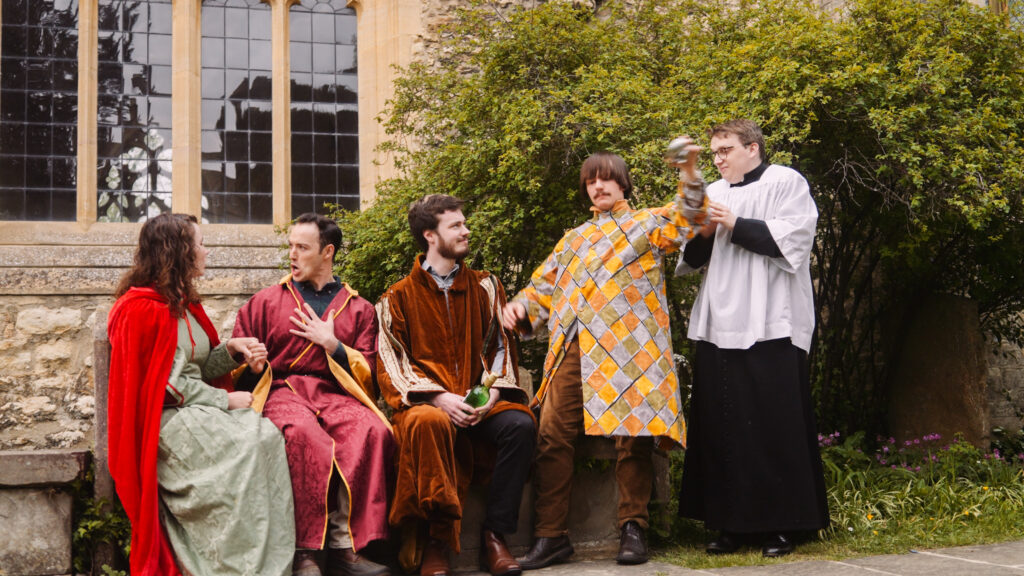
Picture 12: Panic at Cana – the wine has run out at the wedding! What to do?
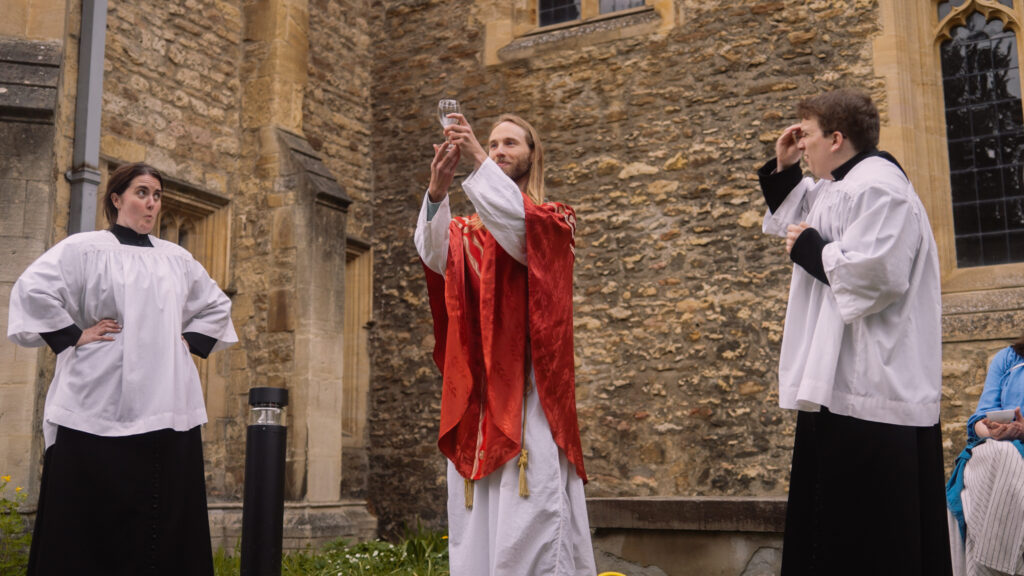
Picture 13: Christ is there to save the day and transforms the water into wine. The servants are amazed!
From Cana, we moved straight to Golgotha and a Middle English performance of the Crucifixion. The York Crucifixion, strangely, is a comedy, and the four soldiers crucifying Christ were accordingly equipped with ‘Cross flatpack instructions’ and giant inflatable hammers. Certainly not inflatable, however, was the cross, which was purpose-built just for this production and turned into a much-coveted prop for numerous plays.
Picture 14: The poor, overworked soldiers struggle to lift up the heavy cross.
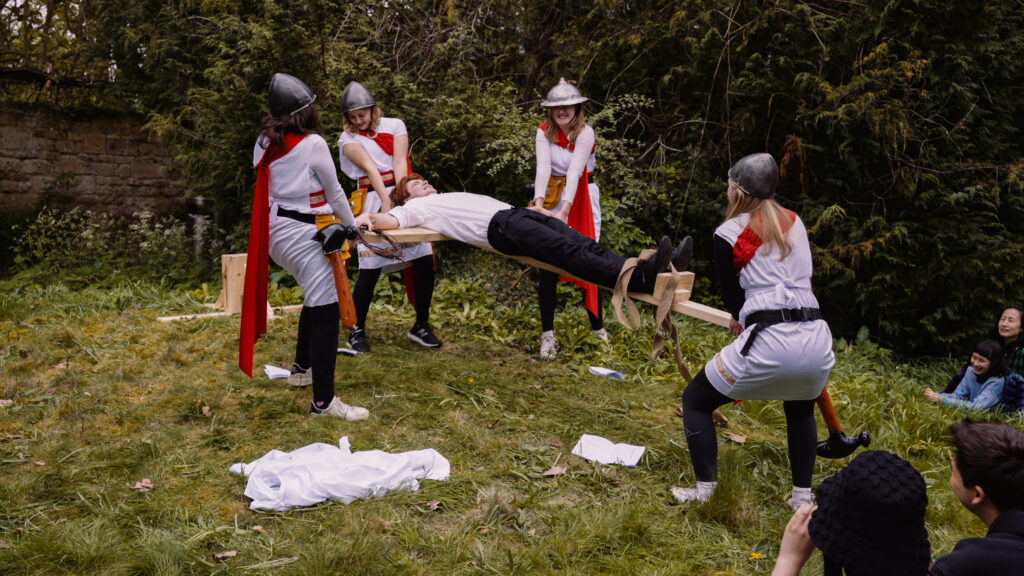
Once the soldiers had vacated the grassy mound in Teddy Hall’s Churchyard, the mourners came: the three Marys (the Virgin, Mary Magdalen, and Mary, Mother of John) and John arrived for the Lamentation, represented by the Bordesholmer Marienklage and beautifully sung in a mixture of Latin and Low German.
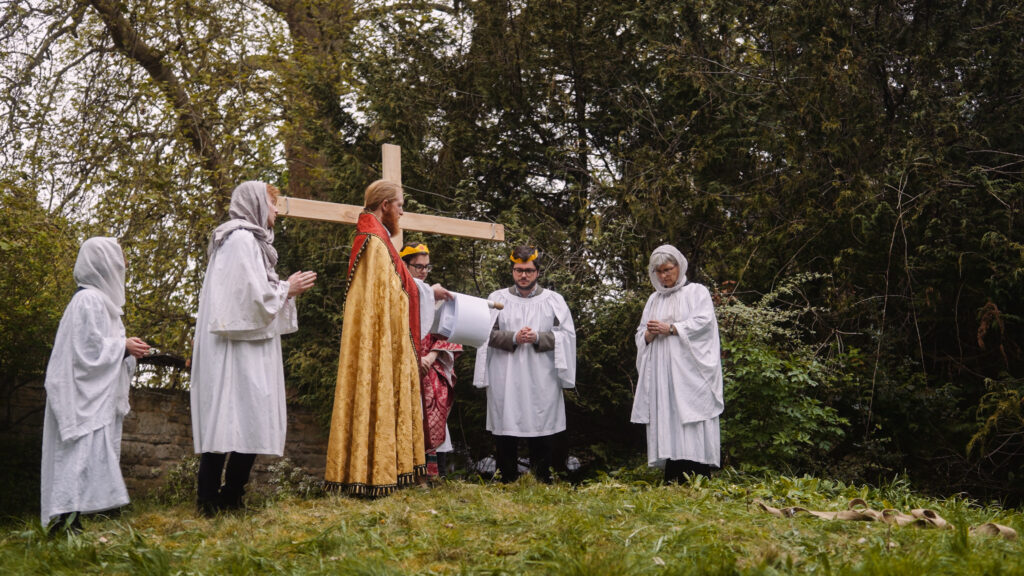
Picture 15: Owe, owe nu ys he dot…
Moving directly from the cross to the crypt, we were told about the Harrowing of Hell by the Choir of St Edmund Hall through sung Latin sequences.
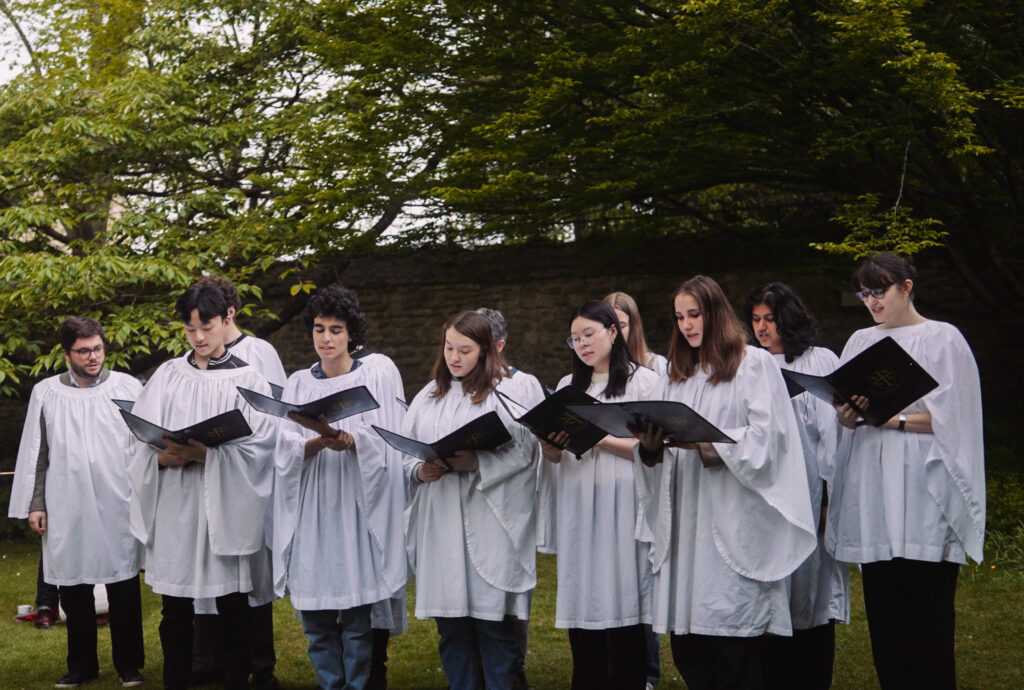
Hell having been harrowed, it was time for another tea break, after which we were welcomed back by the angelic hosts of the Choir (Picture 16). And then it was time for some good news: the Resurrection! Performed in the Middle English of the York version, this play truly had it all: sleeping soldiers, lamenting Marys, bickering priests, and a highly enthusiastic angel.
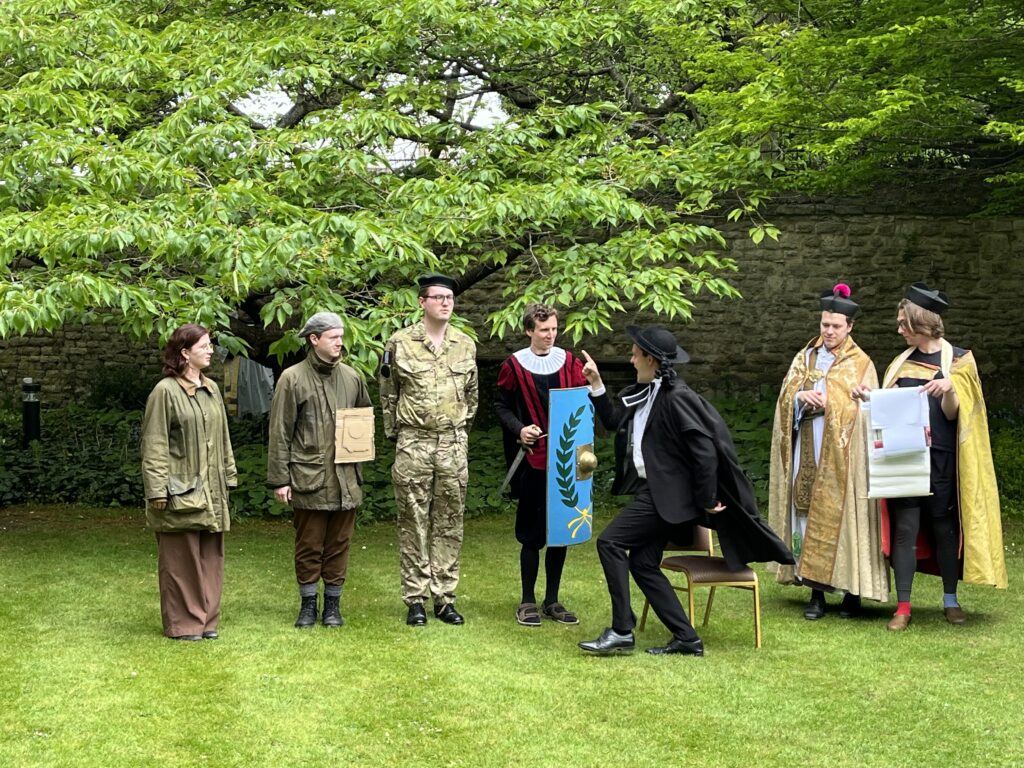
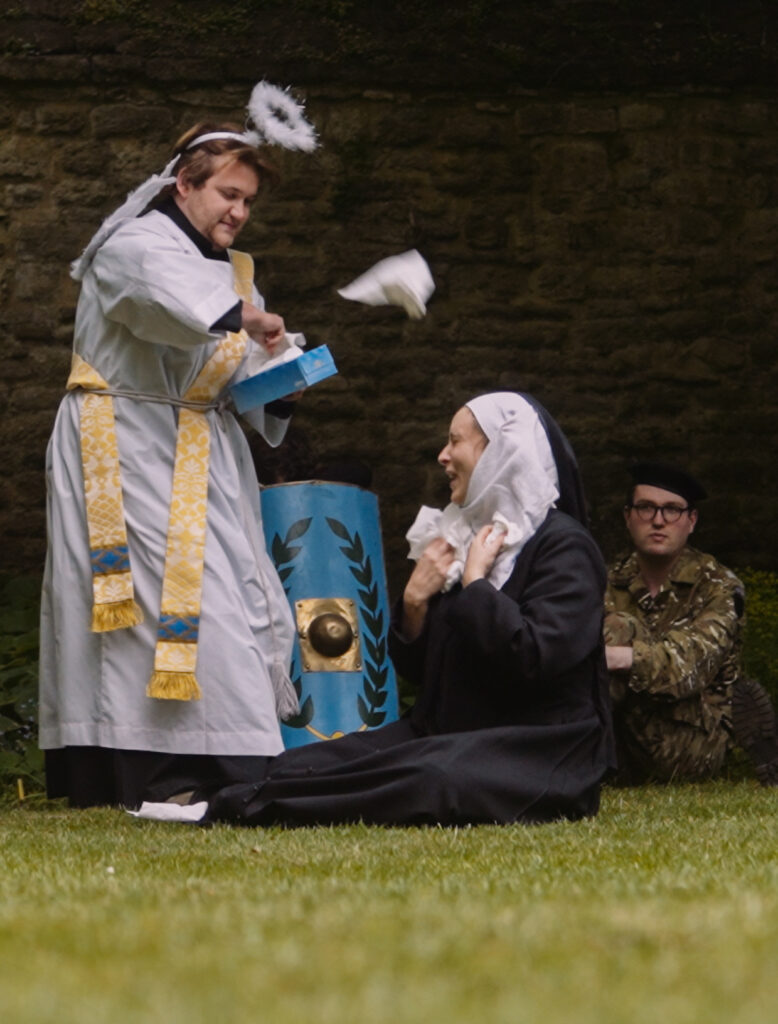
Picture 17: An outraged Pilate commands the soldiers to find out the truth about the rumours concerning Christ’s resurrection. At least Caiaphas and Annas, the extremely well-dressed high priests, are there to back him up. Picture 18: Mary lamenting at the tomb – thankfully, she, too, receives moral support from the angel.
Leaving the Gospels behind, we moved on to the only non-biblical story of the day: The Martyrdom of the Three Holy Virgins by Hrosvitha of Gandersheim, performed mostly in (absolutely flawless!) Latin, with a few bits in modern English.
Picture 19: Governor Dulcitius has been ridiculed by his prisoners, the holy virgins Agape, Chionia, and Irena … his embarrassment will not go unpunished.
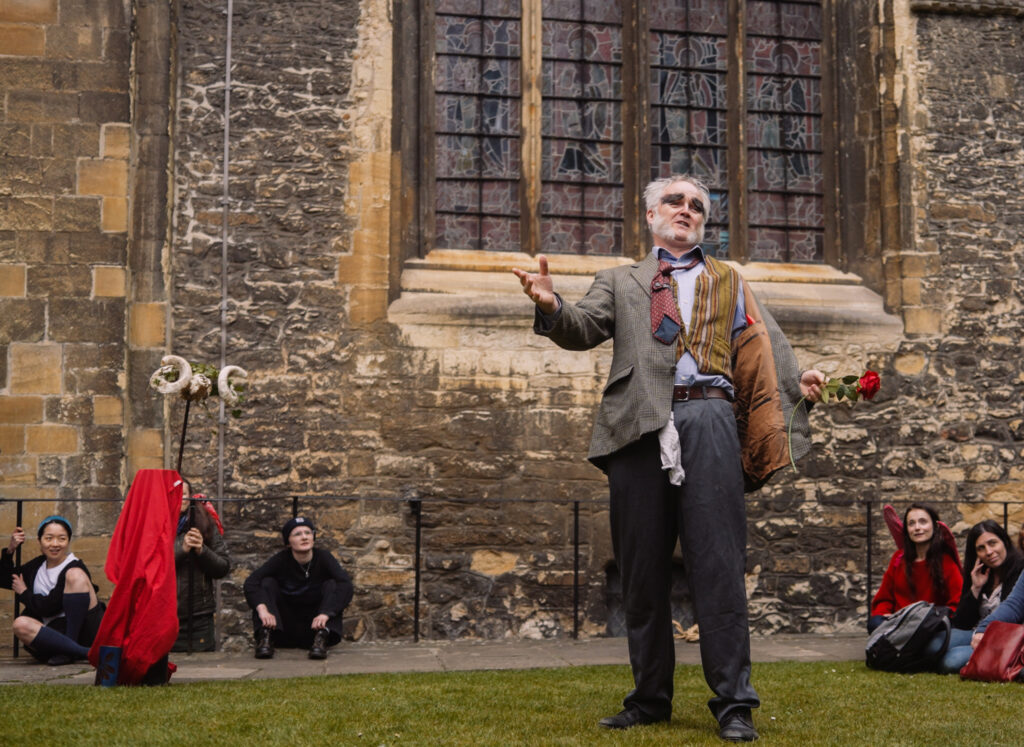
Picture 20: The two older sisters are burned, while the youngest is forced to watch. But never fear: all three will be rewarded in Heaven for their martyrdom.
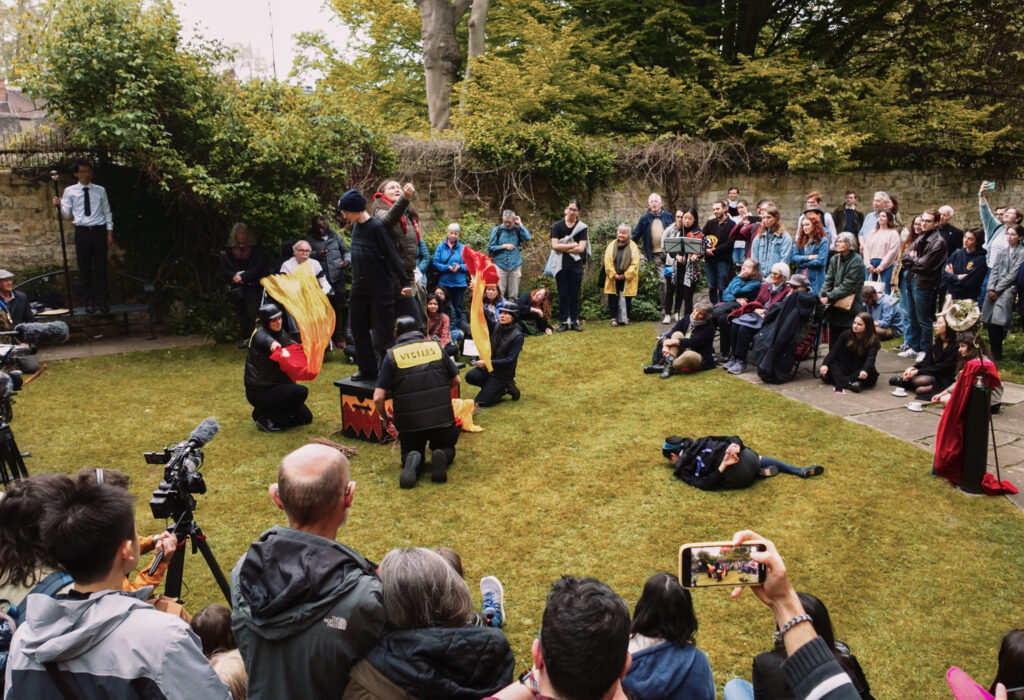
Last, but by no means least, it was time for … the Last Judgement! Performed in a modern English adaptation of different Middle English versions, this wonderfully cheerful and funny play was the perfect end for a fantastic day.
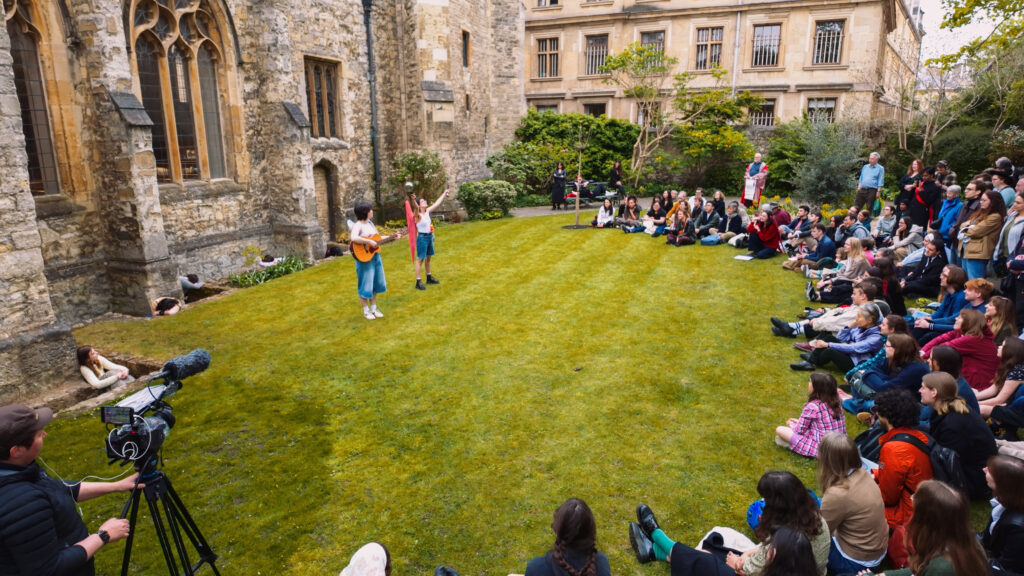
Picture 21: Hey guys, it’s Gabe! The archangels Gabriel and Michael open Judgement day, while the soon-to-be-raised souls rest in the ditch between library wall and lawn.
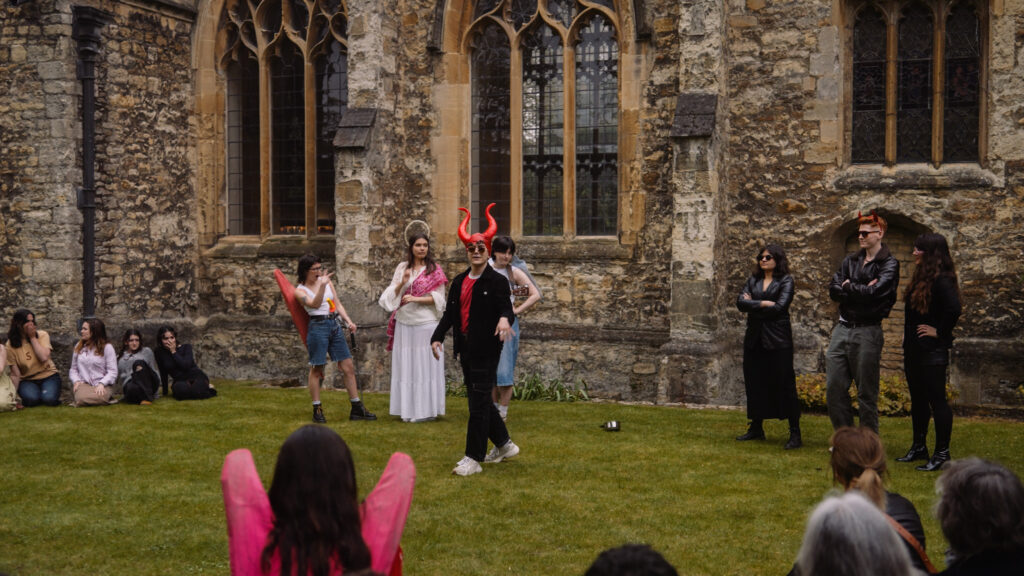
Picture 22: Who will get more souls? Jesus and the angels, or Lucifer and the demons?
And … that was it! Thirteen plays, five languages, two tea breaks, and five hours later, we had travelled all the way from the Creation to Judgement Day, from Heaven to Hell, from Bethlehem to Golgotha, and from Front Quad to the far side of the library.
Our heartfelt thanks goes to everyone who made this day possible: on and off stage, casts, crews, organisers, helpers, and so many more. We are particularly grateful to Jim Harris, our Master of Ceremonies; David Maskell, who wrote the modern English prologues; and Tristan Alphey and the other helpers for their support during the day. This year’s Medieval Mystery Plays are by far the best-documented yet: Ben Arthur, James May, Archie Dimmock, and Tea Smart filmed the entire day; their recordings will be released on the St Edmund Hall Mystery Cycle page at a film launch party at the end of Trinity Term. Ashley Castelino took many fantastic pictures, and Robert Crighton and Liza Graham recorded impressions from audiences and participants for their podcast Beyond Shakespeare.
Of course, what a play really needs is its audience. We were delighted to see so many of you there, and overwhelmed by the amount of positive feedback we received. Here are just some of the comments we collected in our visitor book – many audience members had their favourite play from the host of performances:
“Brilliant! Loved the Nativity especially!”
“Great job! Love the Wedding feast!”
“Terrific! Thank you very much. I particularly enjoyed Adam and Eve, and Satan with his acolytes in [the Last Judgement]!”
“Really enjoyed the camp Satan!”
“The singing [in the Nativity, Lamentation, and Harrowing of Hell] was superb. Altogether a delightful event!”
The best audience members are naturally those who were themselves surprised by how much they enjoyed themselves: one person wrote that they had a “very unexpectedly enjoyable day supporting a friend in one play, but then enjoy[ed] all the others!” Many also appreciated the use of medieval languages in keeping these plays “alive” through modern performance and praised the “pace, diversity, and inventiveness” of the troupes, the beautiful medieval setting of St Edmund Hall, and the overall “vibrant and entertaining” environment of the Cycle. One particularly nice comment described our day of performances as “full of whimsy” – made even more whimsical by the little stars they drew around their comment. Thank you very much to each and everyone of you!
Are you sad you missed out? Can you not wait to get back into medieval drama? Watch this space! The Oxford Medieval Mystery Plays will be back …
Picture Credits
- Pictures 2 and 8: Ashley Castelino
- Picture 6: Rahel Micklich
- Picture 17: Antonia Anstatt
- Header and Pictures 1, 3, 4-6, 9-16, 18-22: Stills from the video recordings made by Ben Arthur, James May, Archie Dimmock, and Tea Smart.

Medieval Mystery Plays: Documentation
That’s the summary of the Medieval Mystery Plays – read on for a more detailed documentation of what the different groups did and what each play looked like.
THE OLD TESTAMENT
1. The Fall of the Angels
Location: Front Quad
Performers: Angels of Oxford
Cast
God the Father – Megan Bruton
God the Son – Carys Howell
God the Holy Spirit – Helen Dallas
Seraphyn – Matilda Houston-Brown
Lucifer – Antonia Anstatt
Cherabyn – Chloe Fairbanks
Angelus Deficiens – Wren Talbot-Ponsonby
Crew
Director – Carys Howell
Dramaturg – Matilda Houston-Brown
Producer – Antonia Anstatt
Text
The Fall of the Angels as transmitted in the York Cycle. Performed in Middle English, with some Modern English elements.
Summary
It is the beginning of the world: God creates the Universe and enjoys his own might. The two Good Angels – Seraphyn and Cherabyn – glorify him, while the two Bad Angels bask in their own beauty and power. God names one of them as Lucifer, the Bringer of Light, which further inflates Lucifer’s ego. But he becomes too confident and, supported by the other Bad Angel (Angelus Deficiens), talks about becoming even higher than God himself. God expels the two Bad Angels from Heaven, causing them to fall into Hell. There, they lament their state and blame each other for their downfall. Back in Heaven, God and the Good Angels celebrate, and God creates Day and Night.
About the Performance
This group chose a modern approach to the play. They set the biblical story in a modern office, with God, split into three as the Trinity, representing the leadership board of the company, and the angels their employees. The play was mostly presented in its original Medieval English, but with a twist: after their Fall from Heaven, the two Bad Angels switched to Modern English.
2. Adam and Eve
Location: Front Quad
Performers: Oxford Medieval Germanists
Cast
Cherub – Carl Haller von Hallerstein
The Lord – Wilfred Lamont
Adam – Henry Nobes
Raphael – Timothy Powell
Michael – Rahel Micklich
Gabriel – Henrike Lähnemann
Eve – Courtney McNeil
Lucifer – Monty Powell
Belial – Graham Salter
Satan – Laurentien Jungkamp
Serpent – Liv Brown
Crew
Director – Timothy Powell
Text
Hans Sachs, Tragedia von schöpfung, fal und außtreibung Ade auß dem paradeyß (1548), adapted by Timothy Powell and Nina Unland. Hans Sachs was a famous German playwright and poet. Between 1548–1560, he wrote 40 religious comedies and tragedies. His ‘Tragedy of the creation, fall, and expulsion of Adam from Paradise’ is an example of a play at the threshold between ‘medieval’ and ‘early modern’ religious drama. It displays many features of emerging ‘early modern’ Protestant religious drama, drawing on the Latin religious dramas of Renaissance humanism, Martin Luther’s reflections on religious tragedy, and the language of Luther’s translation of the Biblical account of the creation and fall of humankind. These elements coexist and interact with numerous elements drawn from medieval mystery plays, especially the extra-biblical episodes involving the three chief devils that keep some of the more light-hearted aspects of ‘medieval’ religious drama alive.
Summary
God creates Adam, then leads him away to show him Paradise. The three angels Raphael, Michael, and Gabriel enter, praising God and the Creation. Once they have left, God and Adam return. God creates Eve, but as soon as the two first humans have left to explore the Garden of Even, three devils appear – Lucifer, Satan, and Belial. They decide to conspire against the humans and call the Snake, who convinces Eve to try one of the apples of the Tree of Life. Eve then gives an apple to Adam; horrified, the two recognise that they are naked. The three devils return and rejoice, followed by the three angles, who weep. Finally, God returns and punishes the wrongdoers: the Snake is made to slither on its belly, Eve is punished with painful childbirth, and Adam with hard manual labour. Then, they are expelled from the Garden of Eden by an angel with a flaming sword.
About the Performance
The entire performance was in Hans Sachs’ original German, except for an English Prologue and Epilogue delivered by the Cherub. The play was performed in Teddy Halls’ Front Quad, with the well serving as the space from where Adam and Eve were created. The Tree of Life was represented by the same cross which, later in the day, served as the cross on which Christ was crucified – an excellent example for the reuse of different props throughout the day. The angels and God were all dressed in liturgical vestments, enhancing their aura of sacrality.
3. The Flood
Location: Front Quad
Performers: The Travelling Beavers
Cast
God – George Rowe
Noah – Oli Hardy
Noah’s Wife – Alice Walton
Ham – Ellie Hall
Shem – Gabriella Berkeley-Agyepong
Japhet – James Lewin, Adam Szep
Ham’s Wife – Madeleine Bainbridge
Good Gossips – Amy Jenkins, Rowan Wilson, Siân Grønlie, George Manning
Crew
Director – Minna Jeffrey
Music and Art – St Giles’ Choir, the children of St Giles’ and St Margaret’s churches
Text
The Chester Flood play in Middle English. The Chester cycle probably originated in the later fourteenth century, although the earliest written version dates to 1422. In later years, the Chester cycle was performed on Whitsun and took three days to perform in full. The Chester play of Noah’s flood is one of several flood plays in Middle English. It was chosen by this group because it has most on the actual animals (eight stanzas) and because of the ‘Good Gossips’. It was set to music by Benjamin Britten as Noyes Fludde.
Summary
Dissatisfied with humankind, God decides to send a great flood. The only ones to be spared are Noah and his family. Noah is tasked with the building of a great ark, on which his family and two animals of every kind will survive. Noah complies and brings the animals and his family – his wife, his three sons, and one of their wives – on board, just the Earth begins to flood. The ark is on sea for a considerable amount of time, but finally, the rain ceases. God commands Noah and his family to disembark and repopulate the Earth. So far, the story is well known, but what is special about this version is the central role of Noah’s family. Especially Noah’s relationship with his ‘crabbed’ and not at all ‘meek’ wife is a topic throughout. There is also a unique scene with the ‘good gossips’: ‘gossip’ comes from Middle English ‘godsib(be)’. Originally, this referred to either godparents or godchildren, but it came to mean one’s close friends (especially women) and did not take on its current meaning of tell-tale before the mid-sixteenth century. In this play, Noah’s wife is reluctant to leave her friends behind when the flood begins, which is framed as disobedience to God – but modern audiences might feel more sympathy.
About the Performance
Although in fifteenth-century English, this play is fairly easy to understand. The group made very few changes to the language, but read the text with Modern English pronounciation.
Among the most remarkable elements of this performance were the animals, which were portrayed by the children of St Giles’ and St Margaret’s churches, who held hand-painted cut-out animals to represent the crowd on the ark. Very helpfully for the audience, the human characters all wore T-shirts with their characters’ names. This group highlighted especially that they felt that the play has a strong contemporary message, given current concerns around extreme weather events, climate refugees, and the denial of climate change, as represented by the good gossips, who ultimately do not escape the flood.
4. Abraham and Isaac
Location: Front Quad
Performers: Shear and Trembling
Cast
Abraham – George Eustace
Isaac – Emily Porter
Angel/Servant – Hanyue Wei
Crew
Director – Miriam Waters
Script Adapter – Miriam Waters
Costume Designer – Emily Porter
Text
The version of Abraham and Isaac from the York Cycle, performed in Middle English. Specifically, taken from Clifford Davidson’s edition of the York Mystery Cycle, which closely adheres to the text in British Library, MS. Add. 35290.
Summary
To test the faith of his loyal servant Abraham, God sends an angel who commands Abraham to sacrifice his youngest and favourite son, Isaac. Despite his sorrow, Abraham resolves to follow the command. He takes Isaac up a hill under a pretense. Once there, he reveals the truth to his son, binds his hands, and gets ready to sacrifice Isaac, who accepts his fate. At the very last moment, the angel of God re-appears and stops Abraham, commending him for his obedience to God and showing him a sheep to sacrifice instead.
The York version of Abraham and Isaac diverges from other iterations of the story by having a grown-up Isaac, who is ‘thirty year and more sumdele’ – around thirty years old, the same age that Christ was believed to have been when he was crucified. The York Abraham and Isaac therefore brings the play closer to the story of the Passion, anticipating the climax of the cycle of performances. Rather than a helpless child, Abraham is asked to kill a son whom he has raised and with whom he has grown old, a strong young man who could overpower his father if he chose to fight back. This also emphasises Isaac’s own acceptance of his fate and his obedience to both God and his father.
About the Performance
This group chose to have the actor playing the angel double as a servant. As a result, God’s messenger appears to watch over – or perhaps spy on – Abraham and Isaac as they go to the mountain to perform the sacrifice. The group got particularly creative with their costumes, drawing on traditional shepherds’ clothing from a variety of times and places and showing the angel as both a messenger and a symbol. A special highlight was the sheep, which was crocheted by a member of the group and caused a round of applause upon its dramatic revelation by the angel.
THE NEW TESTAMENT
5. The Annunciation
Location: Statue of St Edmund in the garden
Performers: Low Countries Ensemble
Cast
God – Oscar de Wit
Gabriel – Johanneke Sytsema
Mary – An Van Camp
Narrator – Irene Van Eldere
Crew
Director – Irene Van Eldere
Script Adapter – Godelinde Gertrude Perk
Text
Die Eerste Bliscap van Maria (The First Joy of Mary), in Middle Dutch, based on the text preserved in Brussels, KBR, MS.IV 192. From 1348 onwards, the city of Brussels held an annual procession on the Sunday before Pentecost to honour a statue of the Virgin Mary. A century after its inception, an extra element was added to the festivities: on the Grote Markt, a seven-year cycle of Bliscap, or ‘Joy’ plays was peformed. Each year until 1566, one of the seven Joys of Mary was staged and celebrated. Of the original seven plays, only two have survived, each preserved in a manuscript in the Royal Library of Belgium.
Summary
God tells the angel Gabriel that he wants to become human and sends him to travel to Nazareth, where he will find Mary. Gabriel is astonished, but complies. He greets Mary, who is reading, and announces that she, albeit a virgin, will conceive a child who shall be called Jesus and be the Saviour of mankind. Mary, too, is astonished by the concept of the immaculate conception, but Gabriel explains that her cousin, Elizabeth, although old and barren, will also conceive a child.
About the Performance
This was the first time a Dutch play was performed in the Oxford Medieval Mystery Plays, and a wonderful addition to the cycle. A particular highlight was the merry angel Gabriel, whose travels from God to Nazareth were accompanied by a jingling bell.
6. The Nativity
Location: Churchyard; in front of the library entrance
Performers: Les perles innocentes
Cast
Joseph/Satan – Elisa Pagliaro
Marie/God – Aurélie Blanc
Host 1/Angel 1 – Anaïs Collonge
Host 2/Angel 2 – Antigoni Tasiou
Host 3/Angel 3 – Christina Morgan
Sophron, a Shepherd – Helene Wigginton
Elpison, a Shepherd – Carmen Vigneswaren-Smith
Philetine, a Shepherdess – Marta Folegnani
Cristilla, a Shepherdess – Inès Trouplin
Crew
Director – Elisabeth Dutton
Assistant Director – Aurélie Blanc
Musical Director – Antigoni Tasiou
Design, Props, and Costumes – Maria Papantuono
Producer – Helene Wigginton
With special thanks to Sandy Maillard (Université de Fribourg, Suisse)
Text
Marguerite de Navarre (1492–1549), Comédie de la Nativité de Jésus Christ, abridged and performed in the original (early 16th century) French.
Marguerite, wife of King Henry II of Navarre, sister to Francis I, king of France, and ancestress of the Bourbon kings of France, was a patron of humanists and reformers, and herself an important writer: she composed poems, a collection of short stories called the Heptameron, and the intense mystical poem Miroir de l’âme pécheresse. She also wrote a number of plays, including dramatisations of scriptural episodes.
Summary
Joseph, travelling on orders of the Emperor, is seeking accommodation for his heavily pregnant wife Mary. Three ‘Hosts’ turn them away, but they find a stable where Mary can give birth. God sends his angels to celebrate the moment of Christ’s coming to earth: the angels praise Mary and her newborn baby, and Joseph kneels and kisses him. The angels announce the arrival of the Saviour to two shepherds and two shepherdesses, who sing on their way to the stable and offer gifts to the baby of milk, a flute, and firewood. Satan appears and laments the loss of the power he has held over mankind since Adam and Eve were expelled from Eden. The shepherds and shepherdesses tell him that they have met the Saviour; Satan argues that such an important person would not be found in a stable, but their faith remains unshaken. Satan, realising he cannot escape God’s power, calls on evil spirits to advise him ‘how to make shadows eclipse the sun’. God proclaims that the willing sacrifice of his son will overcome Satan, and the angels sing in praise of God.
Like the Comédie des Innocents, which les perles innocentes staged at the Oxford Medieval Mystery Plays 2023, the Comédie de la Nativité is both richly theological, presenting the contrast between divine authority and evil tyranny, and deeply concerned with social justice. Marguerite shows humble people challenging corrupt and bullying powers: ordinary women defied the callous soldiers who murdered their children at a tyrant’s command; humble shepherds outface Satan himself, empowered by their newfound faith in a baby who, to their own initial wonderment, has chosen not a great hall but a humble stable as his first home. Once again, Marguerite gives particular emphasis to female characters, portraying female as well as male shepherds, and emphasising the faith, strength, and wisdom of the Virgin Mary.
About the Performance
Just like their previous performances at the Medieval Mystery Plays, this performance of Les perles innocentes, who travelled from Fribourg just for the Cycle, was once again wonderfully rich and detailed. Performed in perfect, but easily understandable, 16th-century French, their staging included such details as the three Hosts looking like proper concierges, and the angels sang beautifully in between the spoken passages. They also built on the Marguerite de Navarre’s emphasis on strong women by having an all-female cast.
7. The Wedding at Cana
Location: Churchyard
Performers: Pusey House
Cast
Angel – Elliott Clark
Bride – Matti Veldhuis
Bridegroom – Ashby Neterer
Jesus – Phillip Quinn
Mary – Ruth Danstål
Master of the Feast – Alex Christofis
Unruly Guest – Nathan Brown
Servants – Natalie Tiede, Richard Garrard
Crew
Director – Phillip Quinn
Script Writer and Adapter – Phillip Quinn, with help from Elliott Clark
Text
The Wedding at Cana was included in the York Medieval Mystery Cycle, but the original text has unfortunately mostly been lost. The script used for this performance was an original composition in Modern English (with some Middle English archaisms), written by Phillip Quinn with help from Elliott Clark and based on the one and a half known lines of the York version.
Summary
When the wine runs out at a wedding in the little Galilean town of Cana, Mary asks Jesus to step in. After some hesitation, his ultimate response is to perform the first miracle of his earthly ministry: transforming several large jars of water into fine wine. In doing so, he heralds the coming of the Kingdom of God and foreshadows the consummation of history in the heavenly banquet at which he himself will be the bridegroom.
About the Performance
Despite its foreshadowing of the Crucifixion at the end and the seriousness of Christ’s miraculous power, the Wedding at Cana is an entertaining story, and this performance brought the hilarious elements out in full. Featuring perplexed servants, drunken wedding guests, the happy couple, and a proud-mother-moment for Mary, it elicited many laughs from the audience.
8. The Crucifixion
Location: Grassy Mound
Performers: The Wicked Weights (Lincoln College Players)
Cast
Soldiers – Jess Hind, Molly Milton, Kyra Radley, Alys Young
Christ – Petru Badea
Crew
Directors – Paul Cooley, Molly Milton
Stage and Script Adapter – Paul Cooley, Molly Milton
Costume Designer – Maureen Abrokwa
Props Designer – Tallula Haynes
Music and Marketing – Anja Woosnam
Administration and Assistance – Rebecca Menmuir, Alison Ray
With special thanks to:
Mike Hawkins (Lincoln College Head Gardener) for creating a crown of thorns
Jonny Torrance (Lincoln College Chaplain) for building a cross
Lincoln College JCR for providing funding
Text
The York version of the Crucifixion (Middle English). The group used a manuscript version which was updated to sound more familiar to the modern English-speaking ear but kept as much of the original language and rhyme-scheme as possible to remain close to the original version of the play. Jesus’ speeches were entirely translated into modern English from the original Middle English, adding a sense of gravity that is wholly unique to this particular edition of the play.
Summary
The play depicts the well-known story of Christ’s crucifixion, but with a twist: despite the undeniable seriousness of the situation, the focus is not on Christ and his suffering, but on the four somewhat inept soldiers who are responsible for nailing him to the cross and erecting it. Throughout the play, they bicker with each other over trivial matters whilst Christ endures his cruficixion with solemnity and without objection. The comedic dynamic between the soldiers contrasts heavily with Jesus’ wholly serious speeches and thus creates a tense atmosphere which toes the line between dark comedy and an exploration of the mundane cruelty of the process of the crucifixion. This invites the audience to consider their own inaction during Christ’s passion.
About the Performance
The Wicked Weights were named after a particularly iconic line in the York Crucifixion. They are a group of Lincoln College undergraduates studying English and were supported by various members of college. A particular highlight of this performance was the towering cross, purpose-built for this day by Jonny Torrance, the chaplain at Lincoln College. Other comedic elements were added to the already surprisingly funny play through prop and costume choices – for instance, the soldiers all had giant inflatable hammers, and were reading their Scripts from ‘Cross Flatpack Instructions’.
9. The Lamentation
Location: Churchyard
Performers: St Edmund Consort
Cast
John – Carlos Rodríguez Otero
Mary – Montgomery Powell
Mary Magdalen – Henrike Lähnemann
Mary, Mother of John – Rebecca Schleuß
Jesus – Lucian Shepherd
Rector – Andrew Dunning
With special thanks to Fr Andreas Wenzel, the chaplain of St Edmund Hall, for permission to use the vestments.
Text
The Bordesholmer Marienklage, in Low German and Latin. The Bordesholmer Marienklage is a remarkable dramatic dialogue from the late 15th century, written for performance at the Augustinian monastery of Bordesholm in Northern Germany by Provost Johannes Reborch. It consists of sung and chanted text for a cast of five: Christ, John, and the three Marys.
The sung dialogue is taken from the liturgy, including verses from the Stabat Mater, to which are added Middle Low German adaptations of the same, sung to similar melodies. The bulk of the action takes place in chanted Middle Low German rhyming verse. A particular feature, unique amongst German Marian Laments, is the survival of detailed instructions which specify that the work should be performed either on Good Friday or on the preceding Monday, and that it should be ‘neither a play nor amusement, but lamenting and wailing and devout compassion for the glorious Virgin Mary’. It was therefore intended to form a part in the monastery’s liturgical life during Holy week; moreover, these instructions and the ‘personae’ throughout continually insist on the necessity of the audience’s participation, through compassion, in Mary’s suffering. It should be performed either in front of the church choir, or – if the weather is fair – outdoors. The ‘personae’ should wear liturgical vestments and Jesus and John ‘dyademata de papiro’ – paper crowns, and that of Jesus was to be decorated with crosses.
Summary
After Christ’s crucifixion, the three Marys – the Virgin, Mary Magdalen, and Mary, mother of John – as well as St John the Evangelist, lament Christ’s death at the cross. At the end, Christ is taken from the cross and laid on the ground.
About the Performance
Complying with Johannes Reborch’s detailed instructions, the five figures in this performance all wore liturgical vestments from the St Edmund Hall chapel, as well as paper crowns (courtesy of Christmas crackers). Singing their lament in front of the cross from the preceding Crucifixion play, this was a wonderful contrast to the entertaining Crucifixion, emphasising the women’s grief after Jesus’ death.
10. The Harrowing of Hell
Watch the performance here and here
Location: Churchyard and Crypt
Performers: The Choir of St Edmund Hall
Cast
Angelic Hosts – Choir of St Edmund Hall
Adam – Shaw Worth
Eve – Molly Bray
Text
Latin Sequences. Sequences, complex liturgical songs with a strong poetic and narrative function, are among the most recent, and therefore truly medieval, sung elements of the Christian liturgy, staging particularly in the Easter Night the fundamental miracle of salvation history, Christ overcoming death.
The version used for these sequences was taken from the Handbook of the Provost of the Cistercian convent of Medingen, like Bordesholm located in Northern Germany. It is kept in the Bodleian Library, MS. Lat. liturgy. e. 18.
Summary
Christ descends into Hell, where he brings salvation to the captive souls there, before overcoming death and rising again.
About the Performance
The Choir of St Edmund Hall picked up seamlessly from the previous Lamentation. Accompanying Christ into hell (the crypt underneath the Teddy Hall Library), they sang the Cum rex gloriae, which tells of the host of angels breaking into hell. There, they were greeted with an Advenisti (you have arrived!) by Adam, Eve, and all the patriarchs and prophets of the Old Testament. Following this sequence, there was a short tea break, marking the significant turning point in the narrative that is Christ’s overcoming of death. After the tea break, the choir opened the third part of the Cycle with the Victimae paschali laudes, in which Mary Magdalen reports her experience of the empty tomb to the apostles.
11. The Resurrection
Location: Churchyard
Performers: St Stephen’s House
Cast
Pilate – Oliver Baldwin
Caiaphas – Lizzy Flaherty
Annas – Edward Parker-Sunderland
Centurion – Felix Trimbos
Mary 1 – Sofia Radaelli
Mary 2 – Danielle Duncan
Mary 3 – Amy Taylor
Angel – Ewan Gillings
Soldier 1 – Tobias Thornes
Soldier 2 – Ben Almond
Soldier 3 – Jonathan Thompson
Soldier 4 – Madeleine Ridout
Text
The York verison of the Resurrection (Middle English). The play fits in well with the liturgical traditions of Easter Sunday. Particularly the Angel’s song and the meeting between the Angel and the three Marys, the so-called Visitatio Sepulchri, is a common theme. It appears that this section of the play reproduces a piece of liturgical drama in use at the time. On the other hand, the representation of Pilate and the High Priests is unusual, drawing on speculations in the apocryphal writings, texts which seek to fill in the imaginative gaps left in the Biblical narrative: what did they really think, and what did they do next?
Summary
The York version of the Resurrection of Christ focuses not on Jesus himself but on three sets of characters who represent three sets of responses to the mystery of Easter Sunday. The play begins and ends with Pilate and the High Priests. To begin with, they are pleased with how the crucifixion went, but the Centurion arrives and tells them of strange occurrences which suggest all is not as it seems. To make sure Jesus stays dead, they set a guard of soldiers to watch the tomb. At the tomb, the soldiers are contrasted with the Marys, who bring oils to anoint the body and are confronted with the empty tomb. An angel arrives and tells them that Jesus is risen and now in Galilee, to which they respond with faith, hope, and love. Meanwhile, Pilate and the High Priests Caiaphas and Annas conspire to cover up the embarrassing and disturbing fact of the empty tomb with a story that the soldiers were overpowered by Jesus’ disciples, who stole the body away. The ironic framing invites the audience to question whose account they believe: is it all ‘fake news’, or is he risen indeed?
The dramatist’s range covers pious devotion, political conspiracy, and the everyday reactions of the soldiers who represent the everyman. Faced with the life-changing reality of the empty tomb, they display the full range of responses from pretending nothing has happened to embracing the truth come what may. The piece is character-driven, often emotive, and finally supremely ironic, drawing the audience in.
About the Performance
The York Resurrection, like the Crucifixion, brings out the human element surrounding the biblical narrative, reflecting the worries of the soldiers at the tomb and the High Priests. The players from St Stephen’s House chose to lean on the already existing comedic elements, turning this into a genuinely hilarious production – complete with gorgeously dressed and very camp High Priests who hand-fed Pilate grapes, and a comforting angel delivering tissues to the weeping Virgin Mary.
12. The Martyrdom of the Three Holy Virgins
Location: Grassy Mound
Performers: Clamor Validus
Cast
Emperor Diocletian/Dulcitius’ Wife – Jialin Li
Agape – Laura Laube
Chionia – Abigail Pole
Irena – Loveday Liu
Governor Dulcitius – Andrew “Stilly” Stilborn
Count Sisinnius – Laurence Nagy
Soldiers – Hillary Chua, Ivana Kuric, Alex Marshall
Angels – Elizabeth Crabtree, Marisia Czepiel
Crew
Director – David Wiles
Stage Manager – Elizabeth Crabtree
Musician – Jessica Qiao
Text
The Martyrdom of the Three Holy Virgins, by Hrosvitha of Gandersheim, performed in a mix of Latin and a new translation. Hrosvitha was an aristocratic tenth-century canoness, and her six plays are a bridge between the classical and medieval worlds. She had a ribald sense of humour and a strong feminist agenda – even this play, despite its serious plot, is a comedy with many hilarious elements. Latin was a language that Hrosvitha used in daily life, and this group sought to discover her unique style, midway between poetry and prose.
Summary
The Roman Emperor Diocletian insists that the three virgin sisters Agape, Chionia, and Irena renounce their Christian faith and marry members of his court. When they refuse, he orders them imprisoned. Governor Dulcitius, seeing their beauty, tells his soldiers to lock the sisters in the kitchen so that he can visit them. That night, Dulcitius embraces the pots and pans in the dark kitchen, thinking they are the women. He leaves covered in soot, and the soldiers think he is possessed. Not realising this, Dulcitius goes to the palace, where he is beaten and ridiculed. In retaliation for his embarrassment, he commands that Agape, Chionia, and Irena be stripped in public, but the soldiers are unable to remove the robes from the women’s bodies. Eventually, Emperor Diocletian orders Count Sisinnius to punish the sisters. Sisinnius orders Agape and Chionia burned alive – their spirits leave their bodies, but their bodies and clothes miraculously are not burned. Despite her sisters’ death, Irena continues to refuse to renounce her faith. She manages to escape the soldiers and stands on top of a mountain. The soldiers are unable to reach her there, so Sisinnius orders one of the soldiers to shoot her with an arrow. She dies, but her spirit is lifted to heaven.
About the Performance
This performance was unique among the mystery plays in several respects. It was the only play performed partly in Latin, and superbly so – the interspersing of Latin with English parts made it easy to follow the story, and the Latin elements gave an indication of how Hrosvitha of Gandersheim had written the play. The players consisted of both students and members of the Iffley community, making this a production spanning a large range of ages and backgrounds. The performance also included music played on a violin, which gave it a wonderfully emotional note. The group chose to perform the play in modern dress, in order to suggest that the impulses driving early martyrs have not vanished in the modern world. For the research behind this production, see David Wiles ‘Hrosvitha of Gandersheim: The Performance of her Plays in the Tenth Century’, Theatre History Studies 19 (1999), pp. 133-150. The group’s name, Clamor Validus, means ‘Forceful Shout’, Hrosvitha’s Latinisation of her Saxon name.
13. The Last Judgement
Location: Far Side of Churchyard
Performers: MSt English (650–1550)
Cast
Jesus – Alicia Camacho Fielding
Lucifer – Daniel Pereira
Archangel Michael – Jasmine Webster
Angel Gabriel – Alice Watkinson
Demons – Leslie Shen, Lauren Allsopp, Olivia Cook
Crew
Director – Emma Nihill Alcorta
Writer – Ruby Whitehouse
Producer – Alice Watkinson
Text
A modern English adaptation of the Middle English The Last Judgement, drawing from the Chester, N-Town, and Towneley cycles.
Summary
It’s the end of the world. God and the angels recall the Creation and the history of humankind. Then the final reckoning comes: the angels call up the dead souls from their graves. One by one, they praise God (the good souls) or lament their own wicked deeds (the bad souls). Jesus, as king of heaven, judges them. He praises the good souls, who ascend singing into heaven, and scolds the bad ones, who are dragged to hell by Lucifer and the demons.
About the Performance
Performed in modern English and with plenty of ingenious staging choices – highlights included the guitar-playing archangel Gabriel, the dead souls popping up from the ditch next to the church, the gummy worms sewn to their clothes, and a hungover Lucifer being roused by his demons to get ready for Judgment Day –, this performance was a wonderful end to the day. After the Jesus-related plays, TheLast Judgement picked up some of the characters who had appeared in the Old Testament plays earlier that morning, including God, Lucifer, and the archangels, which demonstrated the cyclical nature of world history as presented in the Bible.



